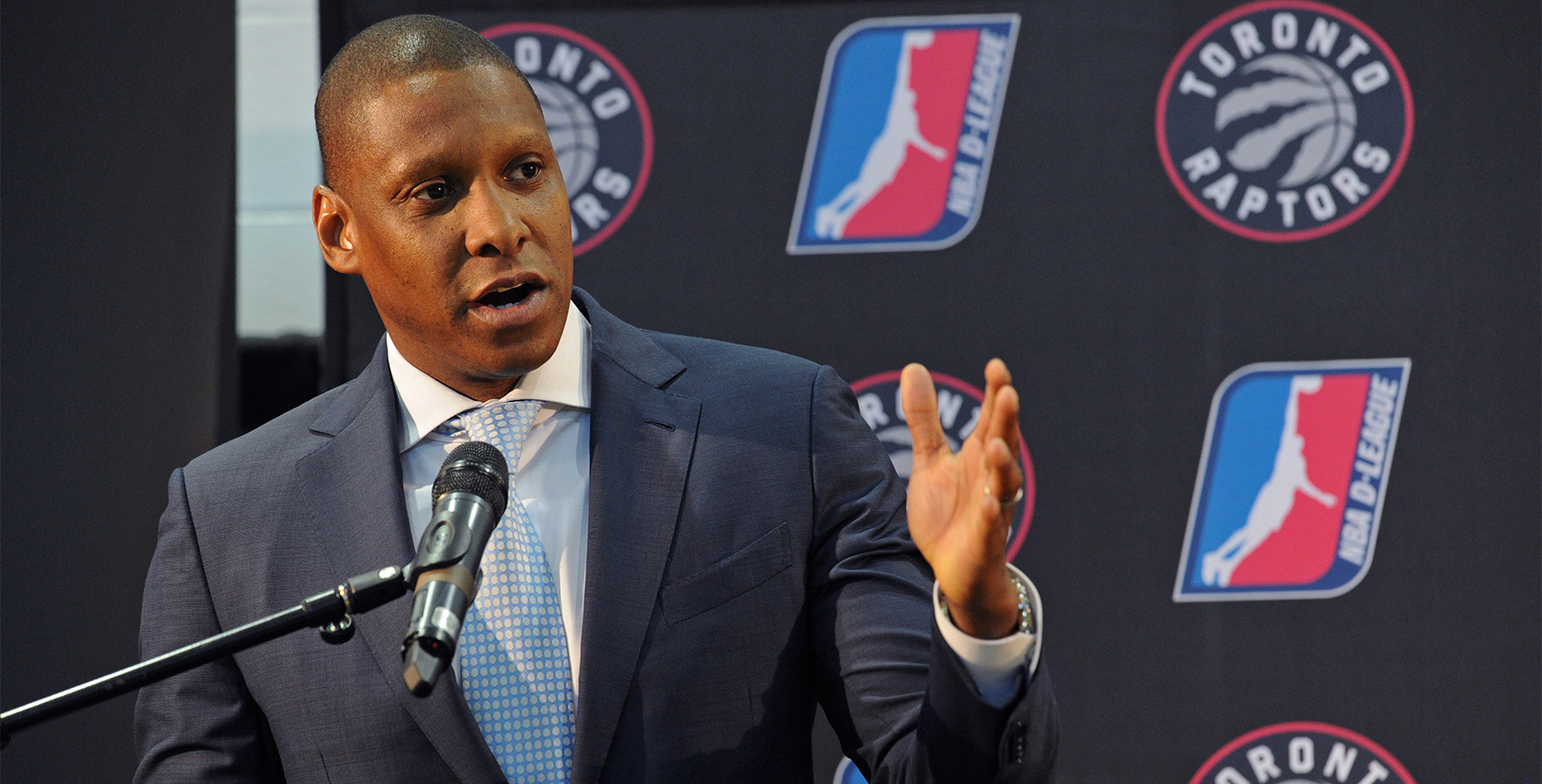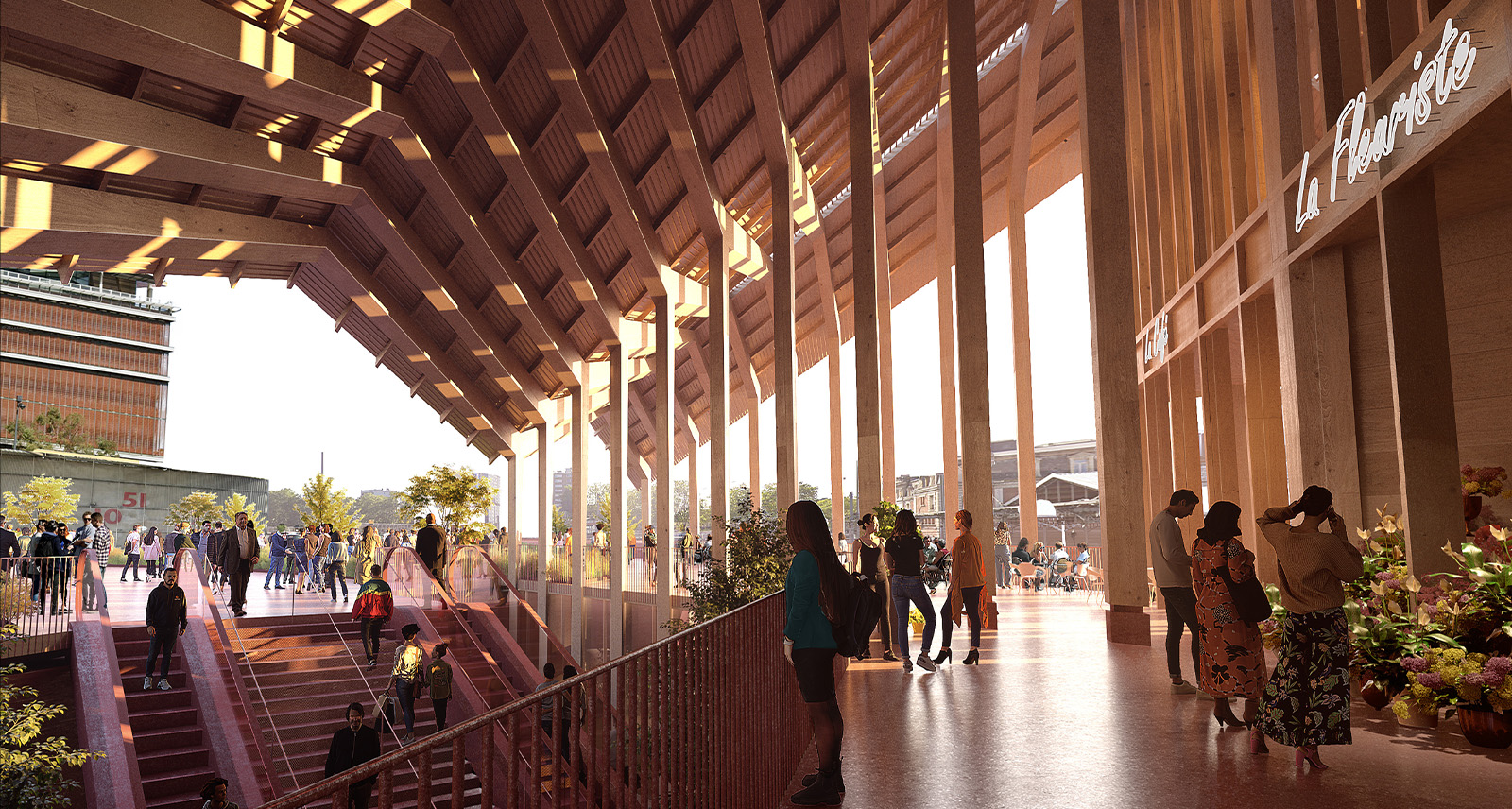Q&A: Raptors GM Masai Ujiri on Building a Winning Culture and Dropping the F-bomb
Before fantasy sports got kids to ditch their dreams of playing like Mike for reveries about trading him, general managers were just faceless suits in the background. Now, they’re stars in their own right. And perhaps no other GM in the NBA is more idol-worthy than Masai Ujiri.
Since rejoining the Toronto Raptors’ front office in 2013, the 46-year-old Nigerian native has been an adrenaline shot into the franchise’s heart, engineering a culture change that’s made the team an Eastern Conference contender. His big personality has cost him — he’s been fined two years in a row for directing expletives at opposing playoff teams (see: “Fuck Brooklyn!”). But it’s also captured the hearts of Canadians coast to coast, and brought hope to legions of fellow Africans with hoop dreams. Here’s to the real MVP.
You’ve got a knack for using expensive four-letter words. Fans find it refreshingly genuine. There’s too much censorship nowadays, isn’t there?
No, I don’t think so. I’m just the crazy one who loves to lose money. It wasn’t the best way of standing up for the team and the fans, but it was the only way I knew at the time. This is me. But I got scolded by my wife, the commissioner, and [Raptors senior advisor] Wayne Embry. I don’t want those three people scolding me anymore, so I’m going to be more careful. Plus, the two times I’ve done it, we haven’t gone past the first round. Maybe I should just be quiet for one year and see how we do.
Raptors fans are used to getting dumped by flighty franchise players for hotter, ESPN-ier American cities. There’s this narrative that NBA stars don’t want to play here. Have you noticed this?
Not at all. It’s cold in Chicago. It’s cold in New York. There are taxes in New York and in California. There are great restaurants in New York and in Toronto. The difference between those cities and us is there’s no history of winning. We don’t have that legacy. We have to create that now. You can be in a remote village — if you build a winning basketball product, players will go there. We don’t have to be apologetic to anybody. If you take history aside, I’d say this organization is a top five NBA team, in terms of ownership, marketplace and fan base. We’re actually lucky. There’s one team and one country. You can galvanize this fan base in a second if you win. Look at what the Blue Jays did this year. It’s crazy! We’re dying for a winning team.
Tell me about Drake. As global ambassador of the Raptors, does he entice players to come here?
Look, Drake is fantastic for our city. We just saw value in having someone like him, who’s a No. 1 fan of our team and loves the game. We do a lot of things off the court, marketing and campaigns. But he has a phenomenal mind, too. People don’t know this: you sit down with Drake and there are tons of ideas that just flow. A couple days ago, I was at home and my wife showed me his new video. It was the one where he’s doing the funny dance. [Mimics “Hotline Bling” dance.] So I texted him to say, ‘Cool video!’ He’s a good friend. One of the smartest guys I’ve ever been around. I can now see how he makes songs, how they just come to him. He’s a quick thinker.
It’s surreal seeing a Canadian at the top of the American rap game. This season you signed two Canuck players: Anthony Bennett and Cory Joseph. Is it important for people to see their own kind succeed at something?
I’ve always believed that. That’s why it’s very important for me to go back to Africa every summer and relate with the continent. Kids have to see it. It has an impact. We have to be role models. They need to see someone and say, “He’s from here. He’s from our place. If he can do it, maybe we can try to do it.” It’s huge.
Did you have a similar moment of inspiration growing up in Nigeria?
I always thought about the NBA. I played soccer first, and I’d watch players like Zico and Maradona and think, “Wow, I want to be as talented as them.” Then I started playing basketball at 13 and it became Michael Jordan and Hakeem Olajuwon. It’s funny. I was at the Board of Governors meeting in New York a couple days ago, and Michael Jordan came to me and said, “Masai, how you doing?” I almost fainted.
I’ll bet when the Denver Nuggets upset the Seattle SuperSonics in the 1994 playoffs, that image of Dikembe Mutombo clutching the ball at the buzzer had huge resonance in Africa.
It did. But I feel Dikembe Mutombo and Hakeem Olajuwon, legends that they are, got shorthanded because they came during a different era. I wish they played in this current era, where they would have had such a bigger platform. They would have affected more kids in Africa, rather than having them listening to a crappy GM coming to tell them stuff. [Laughs.] Can you imagine if we had Olajuwon’s Dream Shake or Mutombo’s finger wag in this era? That stuff would be going crazy all over social media, even in Africa, where everyone has a cellphone now.
Every summer, you return to your home continent and teach kids basketball in your Giants of Africa camps. Why not just kick back on some private island, like most sports execs?
Because I grew up like those kids. I grew up in Africa dreaming. God has given me this opportunity. You bust your ass every day and you remain true to who you are. And one of those things, for me, is loving my continent and using basketball as a tool for helping kids in Africa grow. People say “giving back.” I hate that. I’m not giving back. I have to do it. It’s a responsibility. I have to go back to the continent and figure out a way to affect the youth of Africa. If there are no young African scouts or basketball players or coaches or GMs coming after me, then there’s no success.
Do you think a lot of us in the Western world are ignorant about what’s happening in Africa?
You get disturbed sometimes when talking to people. You get the whole, “Oh, I went to school with an African.” But we have to get the continent better and more people will come. And we’re getting better. The truth of the matter is, everywhere you go, there are good areas and bad areas. I say 80 per cent of the world’s people are genuine and good. There’s 20 per cent who are not so good. And we, as the 80 per cent, have to work harder to outgrow the 20 per cent. That means being good leaders and affecting more people. You don’t have to be a leader of a company or a team or country.
Most sports execs who come to Canada just rent here. But you bought a house. Why?
It’s my home. I’m not hopping on a plane, going somewhere else for the weekend and saying that’s my home. I love it here. My daughter is Canadian. I have a second kid on the way. I’m going to have two Canadians! I’m just mad I can’t follow my wife and my kid into the Nexus line. I don’t think Canadians do the country enough justice in terms of talking about how great it is here. Trust me, if we, in Africa, had a country like this, we’d be telling everybody.










